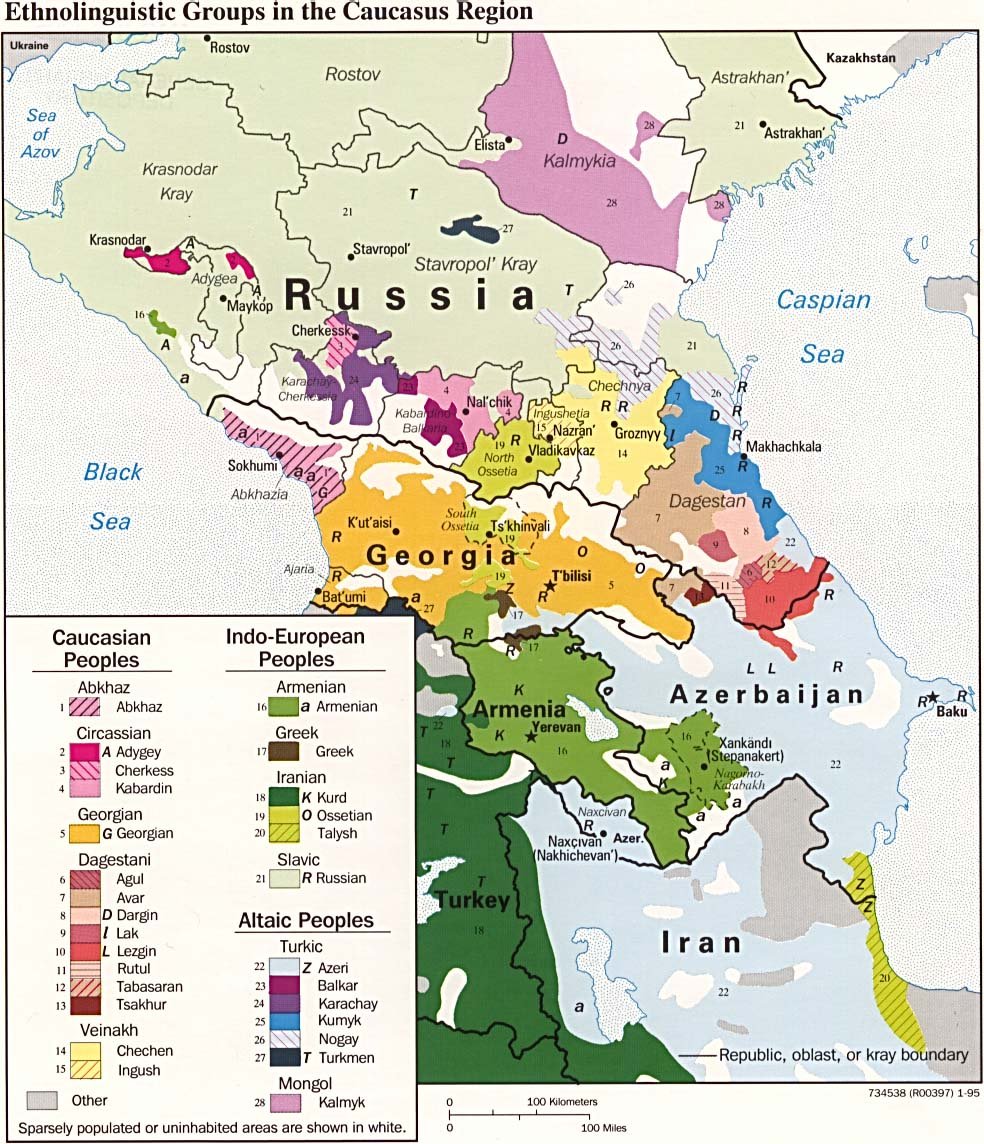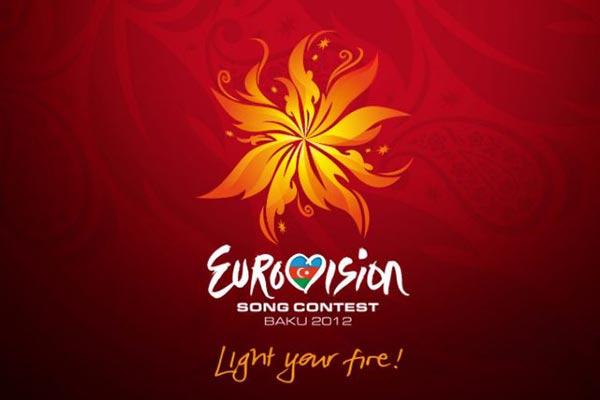Wrong.
Armenia's late departure from the 2012 Eurovision content, to be held in May in Baku, Azerbaijan, illustrates the very real political and social issues lurking just below the surface of disco and glitter. Although originally slated to appear, Armenia withdrew from the competition on March 7, 2012, claiming that Azerbaijan had been unable to guarantee the safety of the Armenian delegation.
So what brought Armenia and Azerbaijan to this point. The answer, like most questions in politics, comes down to land.
| Armenia and Azerbajan are located between the Black Sea and the Caspian Sea in the Caucasus Mountains region. |
 |
| A close of the disputed territory |
While territorial disputes between what is now Armenia and Azerbaijan have long historic roots, including before, during and after World War I, the modern conflict can be traced back to the growing influence of the Soviet Union in the Caucasus region. When both Azerbaijan and Armenia came under Bolshevik control, Stalin originally planned to allocate the Nagorno-Karabakh region to the Armenian Soviet Socialist Republic, along with the Nakhchivan region (the part of Azerbaijan on the far left side of the map) as well as the territory between the two. However, hoping to placate Turkey, Stalin changed the borders, allocating both Nakhchivan and Nagorno-Karabakh to Azerbaijan and, in many ways, wedging Armenia between the two. The Nagorno-Karabakh Autonomous Oblast was formed in the Azerbaijan SSR, with its borders drawn so as to include as many Armenian villages as possible while excluding majority Azeri territories, and separated from the Armenian SSR by a strip of Azerbaijani territory.
Hence, Nagorno-Karabakh is predominantly ethnic Armenian in a country that is predominantly ethnic Azeri. By the time the Soviet Union collapsed in 1989, Nahorno-Karabakh as 76% ethnic Armenian. The Republic of Nagorno-Karabakh (as noted earlier, the region is self-governmening and all but independent from Azerbaijan) self reports that it is currently 95% Armenian. Increasing the difficulty, the ethnic Armenians are predominantly Christian, while the ethnic Azeri are predominately Muslim.
 |
| Source: United States Central Intelligence Agency, 1995 |
In 1988, the Armenian majority began to revolt against Azeribaijan rule, and the local government voted to merge the Nagorno-Karabakh Autonomous Oblast into the Armenian SSR. Armed conflict between Armenians and Azeris ensued, with the Soviet Union granting the Azerbaijan SSR more leeway in controlling the territory. In 1991, Azerbaijan abolished the Nagorno-Karabakh Autonomous Oblast, bringing the territory under direct control of the Azerbaijani government. In November, the ethnic Armenians responded by voting to form an independent state, and by December, full-scale war began between Azerbaijan and the Armenian-supported former Nagorno-Karabakh Autonomous Oblast. By 1994, Armenia controlled 14% of Azerbaijan, and for the first time, Azerbaijan regonized Nagorno-Karabakh as an independent actor in the war. On May 12, 1994, a ceasefire was declared and peace talks began. By this time, fatalities and refugees numbered in the thousands, with claims against the Armenians for engaging in ethnic cleansing against the Azeri. Despite calls from the UN, Armenia has still not withdrawn from Azerbaijan.
Although peace talks continue, lead by the Organization for Security and Co-Operation in Europe (OSCE) Minsk Group, isolated skirmishes continue between Azerbaijani and Armenian forces, including an attack by an Armenian sniper against Azerbaijani forces, resulting in one death, and an Azerbaijani drone being shot down in Nagorno-Karabakh airspace in 2011. And the territory remains one of the most heavily land mined areas in the former Soviet Union, and there are still around half a million refugees and displaced persons. Yet even after 20 years, leaders remain hopefully that a lasting peace can be achieved. Armenia and the Republic of Nagorno-Karabakh retain close ties, although Armenia has resisted internal pressure to formally unite Armenia with Nagorno-Karabakh. The close ties, however, can be evidence in the fact that the former President of the Nagorno-Karabakh Republic (1994-1997), Robert Kocharian, served as both prime minister (1997-1998) and then the president of Armenia (1998-2008).
 |
| Current status of the dispute |
So, what does all this have to do with Eurovision? Well, as we all know, the best way to handle a centuries long dispute is through passive-aggressive sniping at a singing competition.
In 2006, the Armenian singer listed his birthplace as Nagorno-Karabakh, a statement which was later removed from the official Eurovision website due to complaints by the Azerbaijan government. In 2009, the introduction to Armenia's entry included a picture of Nagorno-Karabakh. Again, the Azerbaijan government complained. In retaliation, the Armenian representative who relayed Armenia's results, 2008 competitor Sirusho, read the scores from a clipboard featuring an image from Nagorno-Karabakh while presenting in front of the same image (video below). In addition, Azerbaijan's postcard featured disputed territories in Iran, which Armenia stated created a double standard, as its own postcard did not include the disputed territory.
Additionally, the EBU fined the Azerbaijan affiliate for blurring the number of the voting line for Armenia as well as for disrupting the signal during the Armenian song, with a threat that Azerbaijan could be banned from the competition if such activities continued. Azerbaijan, however, claimed that the breaches of procedure were due to technical difficulties.
We're still not done with 2009, by the way. In August, 2009, the EBU began investigating complaints that Azerbaijani citizens who had voted for the Armenian entry had been detained and questioned by Azerbaijani security personnel for being a security threat, a claim which Azerbaijan denied. Although the EBU did not sanction Azerbaijan, it did note that such questioning was "unacceptable" and it strengthened its privacy rules to protect voter identities.
In the lead up to the 2012 content in Baku, the capitol of Azerbaijan, 22 Armenian singers, including former Eurovision contestants, demanded a boycott of the contest after an Armenian soldier was reportedly killed by an Azerbaijani sniper (it was later confirmed that the dead was the result of friendly fire), claiming "We reuse to appear in a country that is well known for mass killings and massacres of Armenians, in a country where anti-Armenian sentiments have been elevated to the level of state policy."
In decided to finally pull the Armenian entry (although it had already been confirmed as participating), the Armenian EBU affiliate stated, "Despite the fact that the Azerbaijani authorities have given security guarantees to all participating countries, several days ago the Azerbaijani president made a statement that enemy number one for Azerbaijan was Armenians. . .There is no logic to sending a participant to a country where he will be met as an enemy." A member of the Azerbaijan government shot back, stating "The Armenian refusal to take part in such a respected contest will cause even further damage to the already damaged image of Armenia."
The EBU, diplomatic as always, released the following statement: "We are truly disappointed by the broadcaster's decision to withdraw from this year's Eurovision Song Contest. Despite the efforts of the EBU and the Host Broadcaster to ensure a smooth participation for the Armenian delegation in this year's Contest, circumstances beyond our control lead to this unfortunate decision."


No comments:
Post a Comment